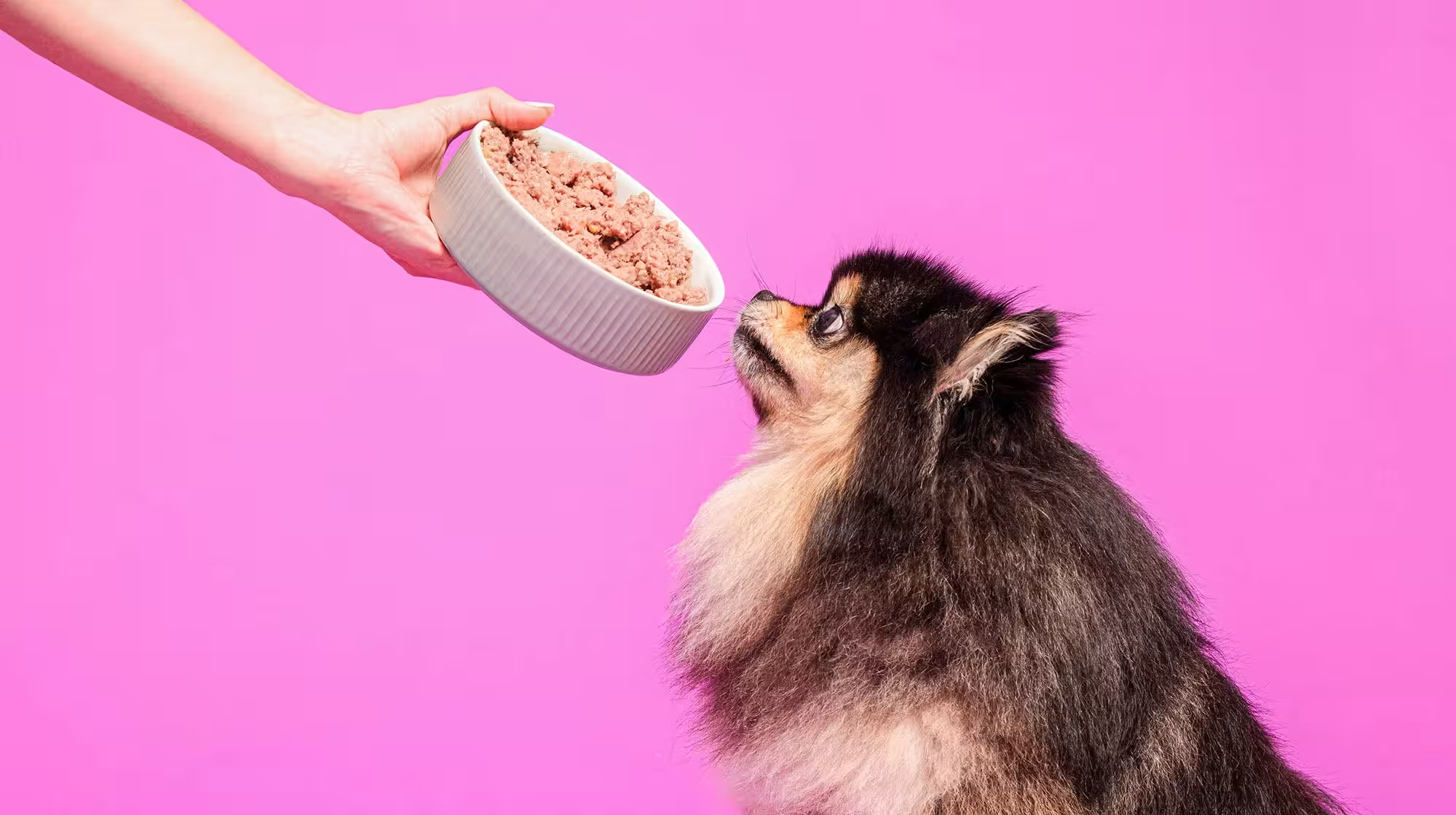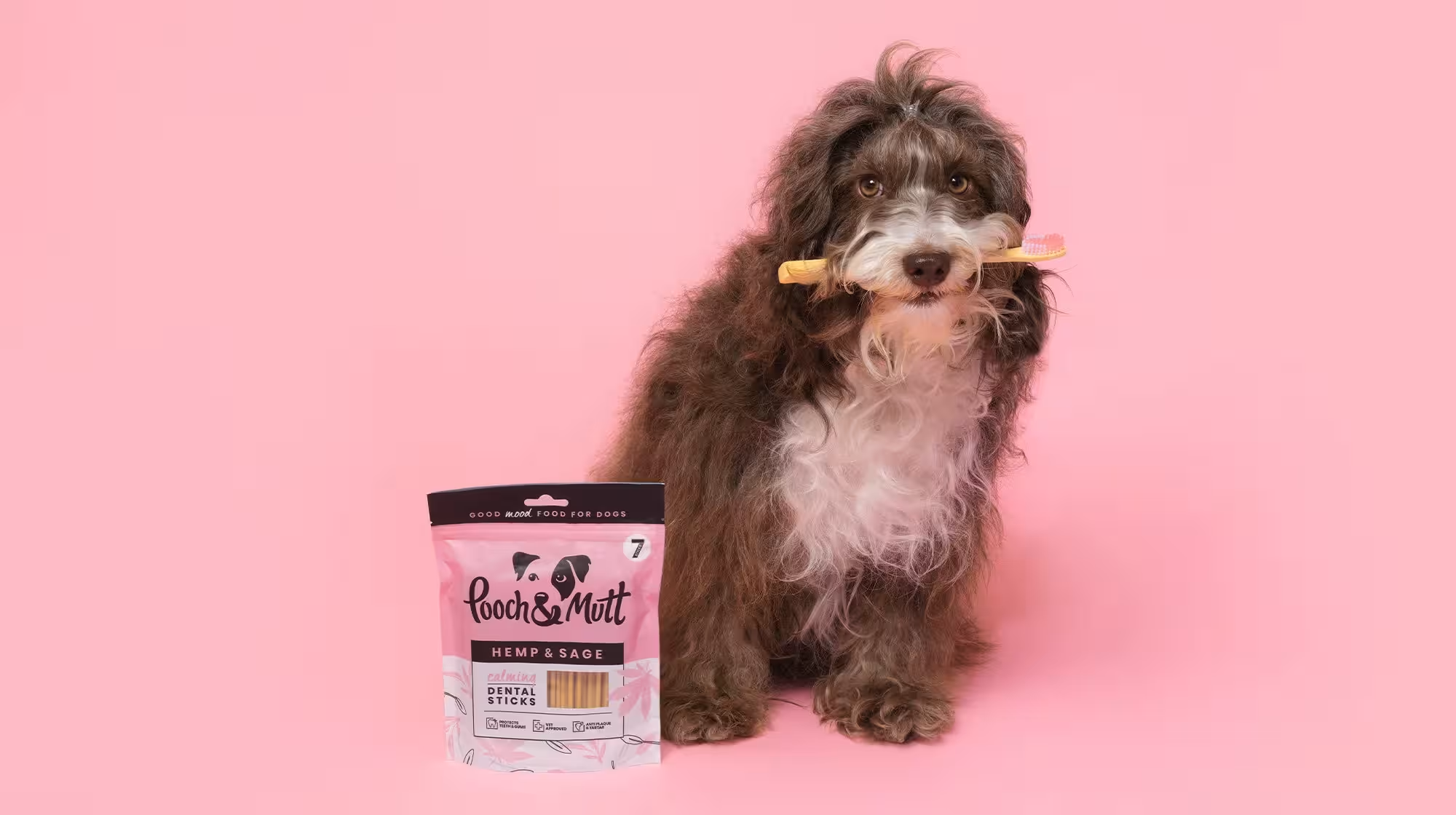You may have never considered adding herbs and spices to your dog’s diet, but believe it or not, there are plenty that are not only safe for your dog to eat, but can be beneficial for their health.
To find out how to safely give your pooch’s food a shot of flavour and nutrition, read on to find out which herbs and spices are safe for dogs, and which should be kept for human dishes only!
Can dogs eat herbs and spices?
Yes, some herbs and spices are safe for dogs, and can even be beneficial when used in small amounts!
But it's important to know which ones are dog-friendly and which should be avoided, as some are toxic for pooches. Think of herbs and spices like dog-safe seasoning - a sprinkle can add a boost of nutrition and flavour, but too much can cause problems, so always keep it light.

Which herbs are safe for dogs to eat?
Let’s go into the most popular herbs you might come across in your own cooking, and explain which are safe for your dog to eat.
Can dogs eat rosemary?
Yes - rosemary is safe for dogs. This fragrant herb is packed with antioxidants and anti-inflammatory compounds that help support digestion, and it’s also great for freshening breath (hence why they're a key ingredient in our Dental Probiotic Meaty Treats !).
Whether you serve rosemary fresh or dried, use it sparingly, as it has a strong taste. Flavour-wise, it goes really well with whole proteins such as fresh chicken.


Dental Postbiotic Meaty Treats
Natural dental dog treats for healthy teeth & gums , crafted with Duck & Rosemary to make dental care delicious.
-
Protects teeth & gums
-
Puppy-friendly
-
Duck & Rosemary
Current price: £3.99
Dental Postbiotic Meaty Treats
Can dogs eat sage?
In small amounts, yes - sage is safe for dogs to eat. It pairs well with meat such as chicken or turkey, and contains vitamins A and K, which is great for vision, immunity, healthy skin and coat, and healthy blood clotting.
Too much sage can cause digestive upset, so just add a tiny amount of fresh sage to your dog’s food, chopped finely. It can also naturally help protect against bacteria, hence why we include it in some of our dental sticks .


Calming Dental Sticks For Dogs
Calming dental sticks for dogs, that support relaxation while promoting oral health. These soothing sticks help freshen breath, reduce stress, and keep teeth and gums healthy.
-
Protects teeth & gums
-
Calming properties
-
Hemp & Sage
Current price: £3.99
Calming Dental Sticks For Dogs
Can dogs eat coriander?
Yes - dogs can eat coriander, also called cilantro. So long as it’s chopped finely and served in small amounts alongside their food, it’s a healthy addition to their diet that can help aid digestion in dogs and contains vitamins A and K.
Can dogs eat parsley?
Yes, dogs can eat flat-leaf parsley and many of them love the taste. Avoid curly parsley, however, as it contains compounds that are toxic to dogs in large amounts.
Like other herbs in this list, flat-leaf parsley is a tasty source of vitamins A, C and K, and is a great breath freshener. It can also support your pooch’s kidney health and aid digestion.
Can dogs eat dill?
Yes, dill is safe for dogs - and it can help reduce dog farts! Dill is sometimes used for curbing gas and nausea in dogs, and contains vitamin C and manganese. Be sure it’s chopped finely and served in small amounts.
Can dogs eat hemp?
Yes, but only in dog-friendly forms. Hemp is very healthy for dogs - the leaves and seeds are rich in omega-3 and omega-6 fatty acids, as well as protein and fibre, which support skin, coat and overall physical health. It can also have a calming effect on dogs.
Try some calming dog treats with hemp , or you could add hemp oil or seeds to food; however, it isn’t recommended to feed your dog any raw leaves, buds or flowers.

Can dogs eat oregano?
Yes, but with caution. Fresh or dried oregano in small amounts is fine for some added flavour - it contains antioxidants and has antibacterial, antifungal and anti-inflammatory properties.
Too much oregano can irritate a dog’s stomach, however, and oregano oil should absolutely be avoided, as this is toxic for dogs. The same applies to marjoram, which is very similar to oregano - feed only a tiny amount and avoid the oil form.
Can dogs eat mint?
Mint is ok in moderation - but avoid pennyroyal mint as that can be toxic to dogs. Spearmint and peppermint are safe for dogs, chopped up in small amounts; mint freshens breath, of course, but it also has digestive benefits and mild anti-inflammatory properties.
You can find mint in our Superfood Dental Sticks !

Can dogs eat basil?
Yes, dogs can eat basil. Basil is rich in antioxidants and has anti-inflammatory and antibacterial properties, and it may even help ease anxiety and arthritis symptoms in dogs. You can sprinkle a small tear of fresh basil onto their food now and then for added flavour.
Can dogs eat tarragon?
No - tarragon isn’t safe for dogs. Tarragon contains compounds that can potentially cause liver damage and tummy issues, meaning your dog might have stomach pains, or even vomiting and diarrhoea after eating it. Though a small amount is unlikely to hurt them, a lot of tarragon can build up and be toxic to dogs. Best to skip it entirely.
Can dogs eat chamomile?
Yes, dogs can have chamomile, but not as a raw flower.
It should be either as a weak tea or as an ingredient in calming dog treats. It may help with anxiety, digestion and skin irritation - but avoid it if your dog is pregnant (speak to your vet to be sure).
The chamomile in our fish-hide chew with chamomile can act as a natural relaxant for your pooch as they enjoy a good chewing session - helping to promote calmness and happiness.


Calming Fish Hide Chews
These calming fish chews are a tasty, long-lasting alternative to rawhide for dogs. Made from Fish Skin, they support relaxation while helping to keep teeth healthy.
-
Safer rawhide alternative
-
Calming properties
-
98% Cod Skin, Chamomile & Lavender
Current price: £4.99
Calming Fish Hide Chews
Which spices are safe for dogs to eat?
Spices can be tricky to balance in meals - so it’s important to be careful when sprinkling them into your dog’s food. Here’s some info on the spices that are dog-friendly, and other spices that are toxic to dogs.
Can dogs eat cinnamon?
Yes, but in only small amounts. Cinnamon isn’t toxic to dogs and it has anti-inflammatory health benefits. Hence why we use just the right amount in our seasonal Pumpkin Spice Probiotic Meaty Treats .
Avoid giving your dog large amounts of cinnamon as the flavour is incredibly strong and can cause irritation to their tongue and throat.
Can dogs eat turmeric?
Yes, turmeric is safe for dogs and has some health benefits. Turmeric is a natural anti-inflammatory, antioxidant and immunity booster in dogs. It also supports joint health and reduces inflammation, so it is especially useful in older dogs with arthritis.
Turmeric is often referred to as liquid gold, and here at Pooch, we make sure your dogs can benefit from its properties by using it within many of our supplements, including our Gut Joint Matrix and Gut Detoxifier Supplement .


Gut-Joint Matrix Supplement
This Gut-Joint Matrix supplement for dogs is vet-developed and backed by science. With 6 diverse probiotic strains, it helps maintain mobility, support the gut-joint axis, and contributes to a healthy immune system.
-
Targets joint inflammation
-
Contains 7 clinically researched joint health bioactives
-
81% saw an improvement in their dog's health
Current price: £18.99
Gut-Joint Matrix Supplement
Look out for health foods for dogs with added turmeric, or you can sprinkle a small amount into their regular food or create a paste out of turmeric powder and water.
Can dogs eat nutmeg?
No - nutmeg is very toxic to dogs.
Nutmeg contains a compound called myristicin, which can cause disorientation, high blood pressure, increased heart rate and even seizures if your dog has eaten a lot of it. If your dog has eaten nutmeg, you should watch out for symptoms and call your vet for advice immediately.
Can dogs eat chilli flakes?
No - don’t add chilli flakes to your dog’s food. It’s spicy, as we all know, so it can irritate your dog’s digestive system and cause tummy pain, gas, vomiting or diarrhoea.
Dogs don’t handle heat the way we do, so it’s best to keep the chilli to your own culinary inventions. Other hot spices such as paprika, cayenne and red pepper should all be considered not safe for dogs, too.
Can dogs eat onion powder?
No - dogs’ bodies can’t process onions or any of the allium family (garlic, leeks, spring onions etc) and that extends to onion powder, or any form of onions.
If your pooch eats any amount of onion powder - because it doesn’t take much - look out for early signs of toxicity such as vomiting, diarrhoea or drooling, and call your vet regardless to ask for advice.
Can dogs eat garlic powder?
No, as garlic is highly toxic to dogs, just like onions and other members of the allium family (leeks, spring onions).
If your pooch has eaten any amount of garlic powder, be sure to call your vet. Early signs of garlic toxicity include vomiting, diarrhoea and drooling, but can lead to eventual collapse.
What are the benefits of herbs and spices for dogs?
Several herbs and spices have natural health-boosting properties for dogs, including:
Basil
Rosemary
Dill
Just to name a few!
The key is to serve them in a dog-safe way and only in small amounts to get the health benefits.
Benefits of herbs and spices for dogs include:
Reducing inflammation.
Boosting digestion.
Freshening breath.
Some can also help reduce gas, nausea and/or anxiety.
Adding a jolt of flavour to your dog’s food also makes their meals more interesting.
How to safely include herbs and spices in your dog’s diet
Using just a pinch is key!
Ideally, the herbs should be fresh and chopped up so they’re only lightly sprinkled on your dog’s meals.
You could also brew some in water like a tea and trickle it over dry food for a juicy boost.
You could also consider paying particular attention to the ingredients list on your dog’s food as some healthy dog food for dogs contains herbs and spices to elevate the nutrient content.
Here at Pooch, we make it our mission to pack our food, treats and chews with the best possible stuff to get your dog feeling great on the inside and looking good on the outside.
Many dog-safe and functional herbs and spices are in a lot of our recipes, including Lavender and Chamomile, which you’ll find in our Calming Range, as they can act like a natural relaxant.
Calming Range
-

 from
fromCurrent price: £41.49
The Calm & Relaxed Bundle -

 from
fromCurrent price: £3.99
Calming Postbiotic Meaty Treats -

 from
fromCurrent price: £8.49
Calm & Relaxed Dry Food -

 from
fromCurrent price: £5.99
Calm & Relaxed Bone Broth -

 from
fromCurrent price: £4.99
Calming Fish Hide Chews -

 from
fromCurrent price: £19.99
Hemp Chewies -

 from
fromCurrent price: £3.99
Calming Dental Sticks For Dogs -

 from
fromCurrent price: £1.99
Calm & Relaxed Complete Wet Food
Which herbs and spices are toxic for dogs?
To summarise clearly, let’s list the herbs and spices that your dog cannot eat. The following herbs and spices are toxic to dogs.
Garlic powder
Onion powder
Chilli flakes (as well as paprika, cayenne, red pepper)
Nutmeg
Mint (Pennyroyal variety)
Oregano (and marjoram) in oil form
Tarragon
If your pooch consumes any of the above, it’s important to take note of what they ate and how much of it, and call your vet immediately.
Signs of toxicity in dogs
Look out for the following signs of toxicity if your dog has eaten any of the above herbs and spices.
Vomiting or diarrhoea
Whining in pain, discomfort
Lethargy, weakness
Drooling
Disorientation, confusion (a common sign of nutmeg poisoning)
Rapid breath, panting
Tremors
Pawing at the mouth
Excessive thirst
Whether they’re showing these signs or not, you should call your vet for an emergency check-up if your pooch has eaten anything you know to be toxic to dogs - including toxic herbs or spices such as garlic powder, onion powder, nutmeg, pennyroyal mint or tarragon.
Can dogs eat dried herbs?
Not really.
We’ve previously mentioned using fresh herbs, as dried herbs are more concentrated than fresh and are sometimes mixed with other seasonings. It’s not a big deal if your pooch eats some food with dog-safe, dried herbs in it, but if fresh herbs are an option, that’s usually a better choice.
At Pooch & Mutt we’ve added a bunch of dog-friendly herbs and spices to some of our delicious grain-free food for dogs . Try our range of fresh recipes packed with whole proteins and powerful supplements, for flavourful meals that will have your pooch feeling happy and healthy from the inside out.




